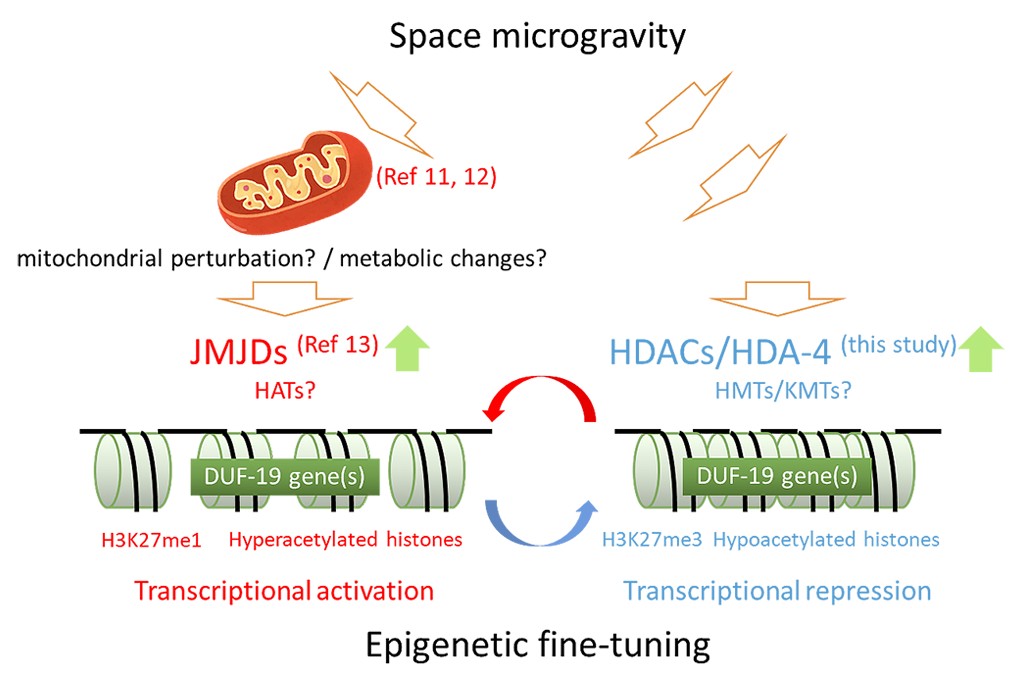In a study of twin astronauts reported last year by NASA, researchers examined epigenetic changes as well as alterations in gene expression associated with a zero-gravity environment. However, the results of this study were inconclusive. In collaboration with JAXA, a group led by Professor Atsushi Higashitani of the Graduate School of Life Sciences, Tohoku University, has discovered epigenetic changes in space-raised nematodes in response to the zero-gravity environment. In the group with the novel DUF-19 gene, which negatively regulates body growth, changes in gene expression were reproducibly linked to epigenetic changes mediated by chromosomal histone modifications. The study revealed a mechanism that regulates growth by preventing excessive growth suppression through the action of HDA-4 under microgravity conditions. These findings were published online in npj Microgravity.
In the zero-gravity environment of space, astronauts' bones and muscles are known to rapidly atrophy, and recently, the effects of the zero-gravity environment on mitochondrial metabolism have become a research focus. Gene expression changes associated with the zero-gravity environment have been observed in cells, model organisms, and humans in space experiments conducted in Japan and overseas. However, to date, the association between these changes and epigenetic changes at the chromosomal level remain unclear.
Among the reported studies investigating the various effects of long-term stays in space, such as the NASA led study of twin astronauts, attempts have been made to simultaneously investigate genome-wide gene expression changes and epigenetic changes. In lymphocytes, most of the genes whose expression was altered by long-term stays in space returned to normal expression levels within 6 months after flight. Epigenetic alterations were identified at several loci. However, more extensive genome-wide alterations occurred in ground-dwelling controls in studies involving twins, preventing these studies from conclusively answering whether epigenetic alterations occur specifically in the zero-gravity environment of space.
The research group has previously conducted experiments in space using Caenorhabditis elegans, or nematodes, as a model organism. These studies have revealed that, similar to those of astronauts, their muscle and mitochondrial functions are reduced when grown in a zero-gravity environment. In the present space experiment, researchers cultured wild-type nematodes and a mutant deficient in the histone deacetylase gene HDA-4, which is involved in epigenetic modifications. These nematodes were continuously cultivated spanning four generations, split between a zero-gravity environment and a space environment artificially altered to have the same gravity as that of Earth. The researchers then examined epigenomic changes together with comprehensive gene expression changes.

npj Microgravity (npj Microgravity) ISSN 2373-8065 (online)
As a result, changes in gene expression and chromosomal histone modification-mediated epigenetic changes were reproducibly linked to the novel DUF-19 gene cluster that negatively regulates body growth. It was revealed for the first time that there is a mechanism that prevents excessive suppression of body growth in zero gravity through HDA-4 function. In the future, these results are expected to serve as a foundation for investigations into mechanical stimulation, motion, and genetic/epigenetic changes associated with them, such as whether similar epigenetic changes occur in astronauts in zero-gravity environments and in terrestrial bedridden patients experiencing disuse atrophy.
■ Epigenetic change: A mechanism that involves modification of chromosomal histones or methylation of DNA without changing the base sequence of the DNA, ultimately affecting gene function. In recent years, epigenetic changes have also been reported to occur in response to environmental factors and diseases including cancer, metabolic diseases, and immune disorders.
This article has been translated by JST with permission from The Science News Ltd.(https://sci-news.co.jp/). Unauthorized reproduction of the article and photographs is prohibited.




